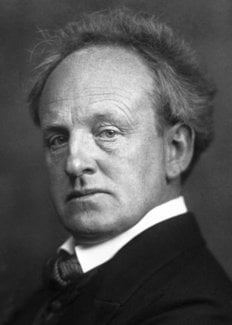Gerhart Hauptmann
Biographical

I was born on November 15, 1862. The place of my birth is Bad Obersalzbrunn, a spa famous for its medicinal springs. The house of my birth is the inn «Zur Preussischen Krone». My father was Robert Hauptmann, my mother Marie Hauptmann, née Straehler. I am the youngest of four children. I remember growing up in an educated and lively middle-class house.
I attended the village school, learned some Latin from a tutor, and had violin lessons. Later I went to Breslau, the capital of our province, where I lived in boardinghouses and attended a Gymnasium. Fortunately, my Breslau school period did not crush me, but it left scars from which I only slowly recovered.
I should have perished if there had not been a way out. I went to the country and began to study agriculture. The tortures of school, begun in 1874, ended in 1878. But agriculture remained an episode. Once in solitude I learned to stand on my own feet and have my own thoughts. I grew conscious of myself, my value, and my rights. In this way I gained independence, firmness, and a freedom of intellect that I still enjoy today.
Hungry for culture, I resumed to Breslau where I spent a second, happier period. I attended the art academy, did sculpturing, learned what youth, hope, and beauty are, the value of friends, masters, and teachers.
I drew, sculptured, drank, wrote poems, made plans, and built castles in Spain. In this mood I exchanged the art academy of Breslau for the University of Jena in Thuringia. In this mood I exchanged Jena for Rome, and later Rome for Berlin.
Although I still worked as a sculptor in Rome, it was here that I finally decided upon literature. A play Vor Sonnenaufgang [Before Dawn] made me publicly known in 1889.
My later works I wrote partly in Berlin, partly in Schreiberhau in the Riesengebirge, partly in Agnetendorf, partly in Italy: they are the condensation of outward and inward fortunes.
Biographical note on Gerhart Hauptmann
Gerhart Hauptmann (1862-1946) gained fame as one of the founders of German Naturalism. After Vor Sonnenaufgang, which created a scandal and, at the same time, was hailed as the beginning of naturalistic drama in Germany, he wrote his most successful play, Die Weber (1892) [The Weavers], the comedy Der Biberpelz (1893) [The Beaver Coat], the historical drama Florian Geyer (1896), Fuhrmann Henschel (1898) [Drayman Henschel], Rose Bernd (1903), and Die Ratten (1911) [The Rats]. But he also wrote symbolic works like Hanneles Himmelfahrt (1893) [The Assumption of Hannele] and Die versunkene Glocke (1896) [The Sunken Bell]. Hauptmann’s later works are often literary in inspiration to the point of being – in the widest sense – revisions of European classics. Der arme Heinrich (1902) [Henry of Auë] is modelled on a German medieval romance; Hamlet in Wittenberg (1935) challenged Shakespeare and Der grosse Traum (1942-43) [The Great Dream] Dante. Greece influenced him deeply, but in his image of Greece archaic and chthonic features predominated: Griechischer Frühling (1908) [Greek Spring], Der Bogen des Odysseus (1914) [The Bow of Odysseus], and above all the Atridentetralogie, of which the last two parts, Agamemnons Tod [Agamemnon’s Death] and Elektra, were published posthumously in 1948.
Other works include the erotic novel Der Ketzer von Soana (1918) [The Heretic of Soana], Buch der Leidenschaft (1930) [Book of Passion], a thinly veiled account of his divorce and remarriage in 1904, and the two autobiographical volumes Abenteuer meiner Jugend (1937 and 1949) [Adventure of My Youth]. His collected works in seventeen volumes were published in 1942.
This autobiography/biography was written at the time of the award and first published in the book series Les Prix Nobel. It was later edited and republished in Nobel Lectures. To cite this document, always state the source as shown above.
Gerhart Hauptmann died on June 6, 1946.
The Nobel Foundation's copyright has expired.Nobel Prizes and laureates
Six prizes were awarded for achievements that have conferred the greatest benefit to humankind. The 12 laureates' work and discoveries range from proteins' structures and machine learning to fighting for a world free of nuclear weapons.
See them all presented here.
